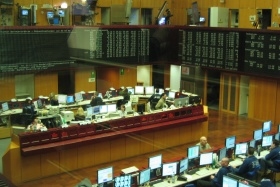Editorial: what now for the NYSE/Deutsche Bórse merger?

The proposed deal will create a European derivatives powerhouse. Advocates of the deal claim that the merged group provides ballast to the CME Group on the other side of the Atlantic and that competition from OTC trading and MTFs will prevent market dominance.
It appears that Joaquín Almunia, Commission Vice President in charge of competition policy, is not so sure. In yesterdays statement, the Commission said it had significant concerns over the possibility of a negative impact on impact on innovation in derivatives products and technology solutions.
The Commission raised concerns over almost every aspect of the derivatives side of the deal, highlighting the possible reduction of fee competition, the vertical silo clearing model as well as a number of other areas including, crucially, index licensing.
Executives in Paternoster Square, the headquarters of the London Stock Exchange will welcome the statement. The LSE , through its derivatives platform Turquoise, is leading the charge for competition in the European derivatives market having launched with a whimper its FTSE 100 futures contract in June in direct competition with NYSE Liffe.
The cynical among us might speculate the contract was launched to prove that competition without fungibility was a chimera.
But the statement raises some interesting questions about what the ultimate result of the investigation might be. Outside an outright rejection of the deal, which remains unlikely despite yesterdays statement, there are a number of possible requirements the Commission might force in order for the deal to proceed. These include:
1. A spin off of Eurex Clearing
2. A spin off of NYSE Liffe
3. A mandate to make trading on Stoxx and other index products fungible
4. Forced access to clearing for all parties
Points one, two and three may be too high a price to pay for the two companies and their shareholders (although ICE will be waiting in the wings if a Liffe spin off is proposed) and point four may be hard to enact.
There is a precedent here. In 2005, when Deutsche Börse and Euronext were competing for control of the LSE, a report by the UK Competition Commission suggested a number of requirements for the deal to proceed. By the time the report came out the deal was already dead in the water but the proposals are worth looking at.
In particular, in the case of Deutsche Börse, it suggested a divestment of Eurex Clearing, a requirement that Eurex Clearing not be used as the provider of clearing services to LSE, or a set of behavioural commitments to prevent it from denying access to competitors.
Mr Niederauer and Mr Francioni will argue that the world has changed since 2005 and the technological requirements needed to compete today require economies of scale that only the tie up can achieve. But it seems that Mr Almunia might well disagree. December 13, when the final report is released, will be an interesting day.
Found this useful?
Take a complimentary trial of the FOW Marketing Intelligence Platform – the comprehensive source of news and analysis across the buy- and sell- side.
Gain access to:
- A single source of in-depth news, insight and analysis across Asset Management, Securities Finance, Custody, Fund Services and Derivatives
- Our interactive database, optimized to enable you to summarise data and build graphs outlining market activity
- Exclusive whitepapers, supplements and industry analysis curated and published by Futures & Options World
- Breaking news, daily and weekly alerts on the markets most relevant to you


